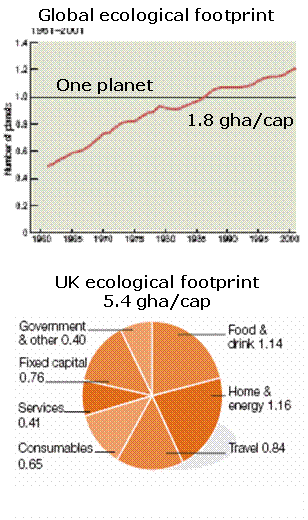Ecological footprint and One Planet Living - is it complete nonsense?
 Perhaps I've got this all wrong... do tell me if I have.
Perhaps I've got this all wrong... do tell me if I have.
There's much excitement about "One planet living" and the concept of an "ecological footprint". WWF has popularised it and David Miliband blogs his enthusiasm. The idea is to convert all the various impacts on the environment to 'global hectares' (gha), the area of productive land required to grow food, extract minerals, manufacture things, build houses, dispose of wastes and absorb emissions for each person. This is then compared to the actually available productive land area per capita. The ecological footprint of the UK is thus determined to be 5.4 global hectares per person (gha/cap) compared with a world average of 2.2 and an available global capacity of 1.8. So here in the UK, we are Three Planet Living or thereabouts.
Given the heady excitement surrounding the idea, I thought I ought to be up to speed. And now I am, I fear the idea is pure nonsense. A few comments:
- The trouble is in the conversion factor for carbon emissions to forested land area needed to absorb the carbon. Land or trees don't absorb much carbon - the overstretched carbon cycle does. Suppose there was enough land available to plant enough trees, we'd be happily One Planet Living, except our carbon cycle would still be 4-5 times overused. The degree of excessive use of the carbon cycle is independent of the available productive land area and so using the latter to characterise the former is nonsense.
- What if the carbon was sequestered in deep oceans or pumped into abandoned oil or gas wells? The actual land area might be very small. The choice of forests to be the mode of sequestration is arbitarary and numbers based on this assumption are nonsense.
- Land area and forests are 'stocks' and carbon 'reservoirs'. Emissions, however, are a 'flow' or carbon 'source'. Forests are carbon 'sinks' only while growing and once mature they stop absorbing. It is wrong to compare them in this way - and the point is conceded in the rare places where the methodology is explained*. You just can't compare stocks and flows like that - it's nonsense.
- How much we modify the climate is a question of the risks we are prepared to take (or impose on future generations). I'd prefer much less risk, but to pretend that all carbon needs to be sequestered is nonsense.



1 comment:
Hi Chris... agree that the comms idea is basically pretty good. And does apply to emissions etc. But I think important for trust and credibility that the narrative strapline doesn't become the analysis.
Post a Comment